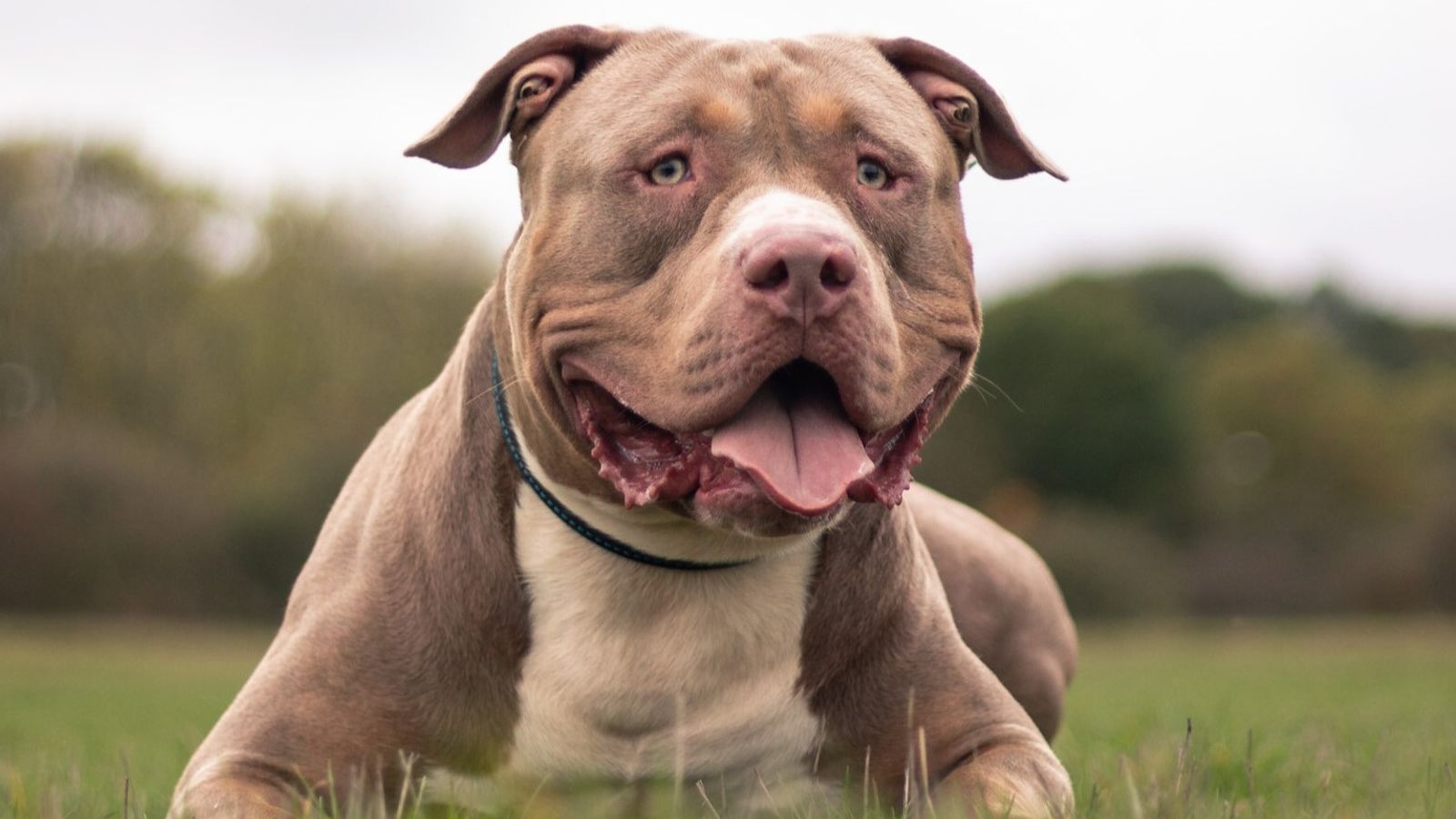Last updated: December 2025
On 15 September 2023, Prime Minister, Rishi Sunak, announced plans to ban the American Bully XL dog in the UK.
Sadly, big changes are on the horizon for the XL Bully dog and their owners in England and Wales. The Dangerous Dogs Act of 1991 is getting a significant update, and owners need to be aware of the key facts. This blog will break down the important details of when and where the ban will take effect and what it means for XL Bully dogs and their guardians.
The Background: The Dangerous Dogs Act of 1991
The history of banning dog breeds in the UK dates back to the introduction of the Dangerous Dogs Act in the 1990s. This legislation was in response to a series of high-profile dog attacks. Over the years, more breeds have been added to the list of banned dog breeds in the UK.
For a full overview of all currently prohibited dog types in the UK, you can see our full banned breeds list here.
When will the ban come into force?
The ban on XL Bully dogs will be introduced in stages. Here are the key dates:
If you have an XL Bully type you only have until midday on 31st January 2024 to complete the application for a certificate of exemption.
Section 1 of the Dangerous Dogs Act 1991 will be officially amended on this date. Once this happens, it will become illegal to:
- Breed or breed from XL bully dogs
- Sell or exchange these dogs.
- Give them away.
- Allow them in public places without being muzzled and on a lead.
- Abandon or allow them to stray.
These rules apply to XL Bully owners, anyone in possession of someone else’s XL Bully, or XL Bully rescues.
31st January 2024: This is the deadline for XL Bully owners to have their dogs exempted from the ban. Owners will need to obtain a Certificate of Exemption. The fee for this certificate is £92.40, and third-party liability insurance is a requirement which you can obtain via The Dogs Trust ” Companion Club”.
Rescue organisations may be allowed to apply for a Certificate of Exemption for XL Bully dogs in their care, but insurance and rehoming may pose challenges.
When will the ban come into force in Scotland?
Scotland have outlined the dates they will be enforcing the ban.
All XL bully-type dogs must be on the Index of Exempt Dogs at DEFRA with an exemption certificate by July 31st.
From the 2nd of August 2024 XL bully types are illegal in Scotland without a Certificate of Exemption
It is also an offence to:
It is a criminal offence to own or possess an XL Bully dog without a Certificate of Exemption.
According to the Scottish government, It is also an offence to:
- have an XL Bully in public without a lead and muzzle
- abandon an XL Bully or let it stray
- breed or breed from an XL Bully
- sell, give away or rehome an XL Bully
When will the ban come into force in Northern Ireland?
From the 5th of July, all XL Bully type dogs must be kept on lead and muzzled. From the 1st of October 2024, the import, breeding, sale, and re-homing of XL Bully dogs will be prohibited in the Republic of Ireland. Additionally, as of 1 February 2025, owning an XL Bully will be illegal without a certificate of exemption.
Will a rescue be able to rehome an XL Bully?
When the ban comes into force, unless the existing rules are changed, a rescue won’t be able to rehome an XL Bully unless it is going to someone who already has or has had responsibility for the dog, and in any event, this would have to be approved by a Court.
Neutering: While neutering is required, the deadline varies based on the dog’s age. If the dog is at least one year old on 31st January 2024, it must be neutered by 30th June 2024. For dogs younger than one year, the deadline is 31st December 2024. Vets may become busy, so it’s advisable not to delay this important step.
Compensation: In the unfortunate event an owner chooses to put their XL Bully down instead of going through the exemption process, the government has said they will offer compensation of £200 per dog (or £100 for rescues). The details of how this scheme will operate are yet to be provided.
Where will the ban apply?
This law will apply in England and Wales, but there’s a possibility it may also extend to Scotland and Northern Ireland in the future.
Which dogs will the ban apply to?
The new ban is vague at best and specifically targets dogs known as the “XL Bully.” The legislation says that the ban applies if a dog’s physical characteristics conform to a breed standard for the XL Bully. However, breeds recognised by The Kennel Club UK do not need to apply even if they match the standard for the XLBully type.
There’s a presumption that if the police label a dog as an XL Bully type, it is unless the owner can prove otherwise. DEFRA has published an official definition of an XL Bully dog with pictures to help owners determine if their dog falls under this category.
What to do now
For XL Bully dog owners, preparing for the ban is essential.
Being informed and proactive is the key to navigating the upcoming ban on the XL Bully. Stay updated on the latest developments, and take the necessary steps to ensure the safety and well-being of your dog.
DEFRA has released a document called “Prepare for the ban on XL Bully dogs“.
Apply for a Certificate of Exemption by email or post to keep an XL Bully dog
The government has now released information on what you must do to get a letter of exemption for your XL Bully.
You can apply for a certificate of exemption by post or email or you can apply for the exemption online
Getting help with muzzle training and loose lead walking with your Bully XL
Muzzle training is a key part of legal compliance and public safety for many XL Bully owners
The government has said that all XL Bully dogs must be muzzled and on lead in a public place, so to prepare for the ban and desensitise your dog to wearing a muzzle, ethical and reward-based techniques should be used. All of the dog trainers and behaviouralists listed on Yappily are compassionate and qualified to help you with this.
We recommend that you use a basket muzzle for your dog. This type of dog muzzle will allow your dog to breathe, pant and accept treats.

Search who is offering dog training in your area
What are the other dogs on the breed ban list in the UK
The other dogs which are banned under The UK Dangerous Dogs Act of 1991 are;
- Pit Bull Terrier.
- Japanese Tosa.
- Dogo Argentino.
- Fila Brasileiro.
Do you have a BULLY XL and need legal help and advice?
We have compiled some useful resources for you if you are seeking legal assistance or advice relating to ownership or any issues you might be facing with your dog.
Deed Not Breed
Deed Not Breed is a Not for Profit Company formed in 2007 to offer free advice to owners of dogs of all breeds on responsible ownership and their legal responsibilities, they offer advice to those who may be facing prosecution or civil action but also work closely with behaviourists, solicitors, local authority dog wardens and police forces across the UK and promote responsible dog ownership and owner education. in 2007 Deed Not Breed, submitted written evidence to EFRA on why the DDA is not effective and suggestions on what would work to counteract this.
DDA Watch
DDA Watch is a free, confidential service run by a team of dedicated volunteers who have many years of experience. They organise peaceful campaigns and awareness initiatives to lobby for a repeal of breed-specific legislation and raise awareness on ‘dog law’ and related issues to policymakers, politicians, other organisations, public bodies, professionals and the public.
Save Our Bullies
Save our Bullies are a team of experts and owners who are standing up against BSL, the XL bully ban and misinformation.
Cooper & Co
Cooper & Co are specialists in criminal and civil dog law throughout the whole of England & Wales and have been at the forefront of the current XL bully crisis offering expert advice.
Why BSL (breed-specific legislation) doesn’t work.
The main focus for everyone involved revolves around ensuring public safety. Nevertheless, it’s become clear that breed-specific bans have not been effective in reducing dog bite incidents. Despite these bans being in place for some time, they have not succeeded in stopping the growing number of dog bite cases.
Data from the NHS paints a concerning picture, with hospital admissions due to dog bites and attacks in England increasing significantly from 3,377 incidents in 2000-01 to 8,758 in 2021-22, marking a substantial 159% rise. This upward trend persists even though four specific dog breeds are already included on the list of banned breeds.
What does Yappily think about the Dangerous Dog Act?
At Yappily, we believe the Dangerous Dogs Act (DDA) doesn’t work for a simple reason. It focuses on banning specific dog breeds or “type”- we think this is a flawed approach. It doesn’t address the core issue, which is responsible dog ownership, proper training and poor breeding practices. Instead of helping, it unfairly targets certain types of dogs on looks alone and not on the individual dog’s behaviour, it also puts pressure on responsible dog owners and families.
We advocate for a better way – one that emphasises education, training, and responsible dog guardianship. By focusing on these aspects, we can prevent dog-related problems and create safer communities for everyone, including our dogs.



Add a comment